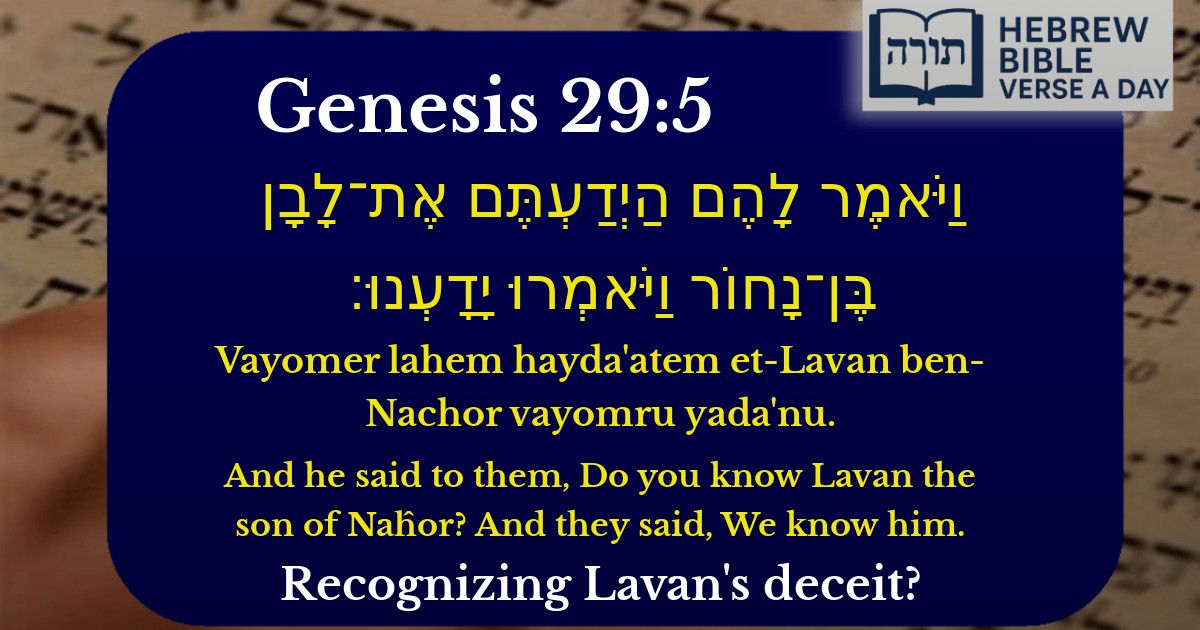Frequently Asked Questions
Q: Who is Lavan mentioned in Genesis 29:5?
A: Lavan (Laban) was the son of Nachor, brother of Rivka (Rebecca), and the father of Rachel and Leah. He is a significant figure in the Torah, known for his dealings with Yaakov (Jacob), as described later in Genesis. Rashi explains that Lavan was a cunning and deceitful person, which becomes evident in his interactions with Yaakov.
Q: Why does the Torah mention that the shepherds knew Lavan?
A: The Torah highlights that the shepherds knew Lavan to show that he was a well-known and influential figure in the region of Charan. According to Ramban, this detail sets the stage for the later narrative, where Yaakov encounters Lavan and his family, leading to significant events in Jewish history.
Q: What is the significance of Lavan being called 'the son of Nachor' in this verse?
A: The Torah specifies Lavan as 'the son of Nachor' to clarify his lineage and connection to Avraham's family. Nachor was Avraham's brother, making Lavan part of the extended family. This detail is important because it shows the familial ties between Yaakov and Lavan, which play a crucial role in the story of the Jewish people.
Q: How does this verse connect to the broader story of Yaakov in the Torah?
A: This verse introduces Lavan, who becomes central to Yaakov's story. Yaakov later works for Lavan, marries his daughters Rachel and Leah, and has children who become the Twelve Tribes of Israel. The Midrash emphasizes that this encounter was divinely orchestrated to fulfill Hashem's plan for the Jewish nation.
Q: What lesson can we learn from the shepherds' response in this verse?
A: The shepherds' simple acknowledgment ('We know him') teaches the importance of recognizing influential people in our lives and communities. The Talmud (Chullin 95b) discusses how even casual conversations in the Torah carry deeper meanings, reminding us to be mindful of our interactions and the information we share.


Context of the Verse
The verse appears in Bereishit (Genesis) 29:5, where Yaakov (Jacob) arrives in Charan and encounters shepherds near a well. He inquires about Lavan, the son of Nachor, to confirm his location and connection to his mother Rivka's (Rebecca's) family. The shepherds affirm their knowledge of Lavan.
Rashi's Explanation
Rashi (Rabbi Shlomo Yitzchaki) comments that Yaakov specifically asked about Lavan "the son of Nachor" to distinguish him from another Lavan, as names could be common. By mentioning Nachor (Lavan's grandfather and Avraham's brother), Yaakov ensured they would recognize the correct individual. The shepherds' response, "We know him", confirms their familiarity with Lavan's identity and reputation.
Midrashic Insights
Halachic and Ethical Implications
Rambam (Maimonides) in Hilchot De'ot (Laws of Ethical Conduct) underscores the importance of clear communication to avoid misunderstandings. Yaakov's precise wording aligns with the principle of "derech eretz" (proper conduct), ensuring his inquiry was unambiguous. This teaches the value of specificity in speech, especially when seeking assistance or information.
Symbolism in the Exchange
The Ohr HaChaim (Rabbi Chaim ibn Attar) notes that the shepherds' acknowledgment—"We know him"—carries deeper meaning. Their awareness of Lavan foreshadows Yaakov's impending trials with him, illustrating Divine Providence in guiding Yaakov to his destined challenges and eventual growth through adversity.